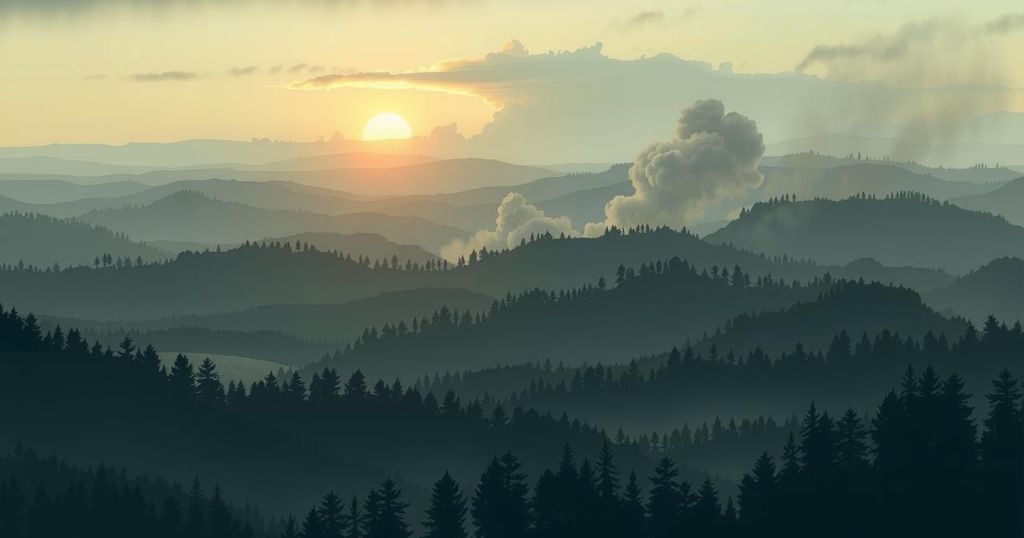Rwanda-backed M23 fighters have advanced in the eastern DRC, capturing Goma and prompting international calls for urgent negotiations. The escalation of violence has led to a humanitarian crisis, displacing hundreds of thousands and causing severe shortages. Despite external pressures, Congolese President Tshisekedi avoided talks with Rwanda, further complicating resolution efforts.
Rwanda-backed fighters have made significant territorial gains in eastern Democratic Republic of the Congo (DRC), particularly in Goma, after intense confrontations with the Congolese military. This escalation has incited calls for urgent dialogue from mediator Angola, as well as growing international concern over a potential humanitarian disaster. The DRC has requested global intervention to halt the M23 group’s advance, which can be linked to the historical conflicts following the 1994 Rwandan genocide.
Following the capture of Goma, residents reported a return to calm on Wednesday, although essential resources like food and medicine are scarce. A Goma inhabitant, Jean de Dieu, expressed resilience amid the crisis, saying, “Today we are not afraid.” However, another local, Kahindo Sifa, lamented their dire situation, citing a critical shortage of basic necessities.
Despite international pressure, Congolese President Felix Tshisekedi did not participate in talks with Rwandan President Paul Kagame concerning the conflict. At a recent East African Community summit, leaders emphasized the need for peace and urged the DRC to engage all parties, including the M23. Angola has played a mediating role previously and is advocating for urgent discussions between the two countries’ leadership.
As of now, M23 fighters have advanced without resistance in South Kivu and continue to impose their control in Goma, where they have taken critical infrastructure, including the local airport. The ongoing violence has exacerbated a humanitarian crisis, displacing over 500,000 individuals in recent weeks, as reported by the United Nations. Clashes in the region have resulted in substantial casualties, with more than 100 dead and numerous others injured.
In downtown Goma, the military presence of Congolese soldiers has diminished, leaving the city largely under M23 control. Reports indicate looting and disorder, with M23 fighters parading captured soldiers. One local, Merdi Kambelenge, noted that while the situation had stabilized, the absence of electricity meant they were “cut off from the world.”
In Kinshasa, protests erupted against perceived inaction by various governments during the ongoing violence. Following clashes, authorities imposed a ban on further demonstrations. Furthermore, the United States and Belgium issued advisories to their citizens, emphasizing the deteriorating security situation in the DRC, with airlines suspending flights.
International bodies, including the UN and US, have called for the withdrawal of Rwandan forces from the DRC. However, Rwanda’s representatives have stated that the M23 will continue its advancement, potentially threatening to extend beyond eastern regions. Allegations persist that Rwanda is seeking control over DRC’s rich mineral resources, a claim which Rwanda denies, asserting that their involvement aims to combat the FDLR, a group linked to the Rwandan genocide.
The ongoing conflict in eastern DRC is rooted in decades of instability, influenced by the aftermath of the 1994 Rwandan genocide, which created enduring tensions in the region. The M23 armed group is one of several factions vying for control of rich mineral resources within the DRC, which includes deposits of gold, cobalt, and coltan. These resources have made the DRC a target for exploitation, leading to continuous cycles of violence. The international community has expressed concern over the humanitarian implications of this conflict, as thousands are displaced and suffer from food and water shortages.
The situation in eastern DRC remains critical, with Rwanda-backed M23 fighters making significant territorial gains amid widespread humanitarian strife. While international calls for dialogue have intensified, Congolese leadership remains firm against negotiations with Rwanda. The ongoing violence highlights the fragility of regional stability and the complexities surrounding the exploitation of DRC’s vast mineral wealth.
Original Source: www.wfxg.com






